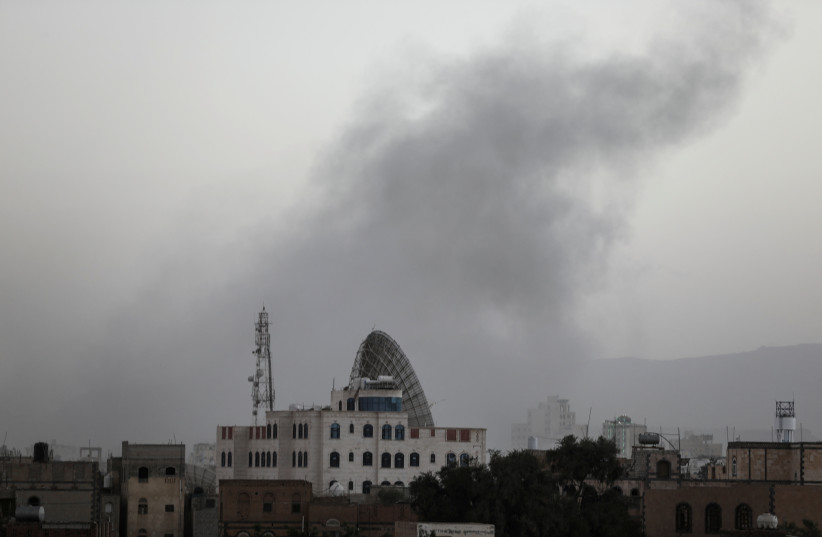Ever since the Arab Spring in 2011, Yemen has been torn apart by civil conflict, an extension of internecine strife that goes back much further. The main, but far from the only, protagonists in the current struggle are the Houthis, a fundamentalist Shia militia group heavily dependent on Iranian support, and a Saudi Arabia-led coalition of Sunni states determined to prevent Iran gaining complete control of Yemen, and thus vastly extending its power in the region.
The battle has flowed this way and that over the past seven years, but the Houthis have gained more than they have lost. Currently, the Iranian regime is the de facto rulers of a broad swath of Yemen, controlling much of the commerce through which humanitarian aid flows. The UN has made valiant efforts over the years to broker a peace deal and from time to time the Houthis have given lip service to the idea, but none has stuck.
The militancy of the Houthis, backed by Iranian military hardware, is growing and to their shame, they are making increasing use of children. A four-member panel of UN experts maintains in an annual report to the Security Council, circulated on January 22, that nearly 2,000 children recruited by the Houthis have died on the battlefield. They say the Houthis use summer camps and a mosque to recruit children and disseminate their ideology.
“The children are instructed to shout the Houthi slogans ‘Death to America,” “Death to Israel,” “Curse the Jews,” and “Victory to Islam,” say the experts. “In one camp, children as young as seven were taught to clean weapons and evade rockets.”
The panel said it had received a list of 1,406 children recruited by the Houthis who died on the battlefield in 2020, and 562 child soldiers killed between January and May 2021.
For about a year, the Houthis have been firing ballistic missiles into Saudi Arabia’s capital, Riyadh. On January 24, they launched a missile at the United Arab Emirates (UAE) for the first time. On February 1, another was fired from Yemen, as the Gulf state hosted President Isaac Herzog. The UAE’s surface-to-air interceptors struck it down, but the United States (US) military launched interceptor missiles in response to the attack, as well.
White House Press Secretary Jen Psaki said that the US military had used “Patriot interceptors to… [support] efforts by the armed forces of the UAE”, adding “I would say we are working quite closely with them.”
The intervention marks a welcome widening of US involvement in Yemen’s seven-year war between the Houthis and the Saudi Arabia-led military coalition, which includes the UAE. Initially, the Biden administration’s reaction to the Iranian threat, and in particular to Iran’s increasingly powerful position in Yemen via its Houthi proxy, was less than comforting to the Sunni Arab world and to Israel. Intent on re-engaging with Iran in an attempt to renew the nuclear deal, Biden rejected the hard line adopted by Donald Trump. The hardening of the US stance in Yemen may reflect Washington’s confidence at achieving some sort of deal in the Vienna talks.
IT IS generally accepted that one key factor, among others, uniting Israel and the Arab signatories to the Abraham Accords is to frustrate Iran’s aspiration to dominate the Middle East. The Iranian regime pursues this ambition unremittingly across the region directly by way of its own Islamic Revolutionary Guard Corps (IRGC) in Syria and Iraq, and through a variety of proxies, such as Hezbollah in Lebanon, Hamas in Gaza, extremist groups in Iraq and the Gulf, and in Yemen by way of the Houthis.
Saudi Arabia is attempting to deny Iran a major role in Yemen’s future. What the world’s political leaders cannot or will not believe is that Iran has its own agenda. It is pursuing domination of the Middle East and supports a widespread Shi’ite terrorist network to achieve it. The regime’s enmity toward Western democracy in general, and the US and Israel in particular, is fundamental to its purpose. Equally unshakable is its intention to acquire nuclear weapons.
British-born Martin Griffiths was serving as UN special envoy for Yemen in 2018. He succeeded in bringing the two main protagonists to the negotiating table on December 6, 2018. Eventually, the talks were overtaken by renewed conflict, but the fact that negotiations are possible should be the template on which US policy is designed. UN Resolution 2216, which aims to establish democracy in a federally united Yemen, should be the basis.
Any new effort would have to be backed by a UN peace-keeping force. Through whatever means would be most effective, new sanctions if necessary, Iran must be deterred from supplying the Houthis with military hardware. Humanitarian aid must be given unfettered access to all parts of Yemen. A lasting political deal would, of course, involve the end of the Saudi-led military operation and probably a major financial commitment by Saudi Arabia to fund the rebuilding of the country.
Finally, the Houthis must be given the opportunity to choose. Do they wish to remain an outlawed militia permanently or would they prefer to become a legitimate political party, able to contest parliamentary and presidential elections, and participate in government? The price would be serious engagement in negotiations aimed at a peaceful transition to a political solution for a united Yemen, perhaps a form of a federal constitution.
The US-Iran nuclear deal talks in Vienna seem close to an agreement. Is Biden still wedded to his original Iran-appeasement policy, has he moved sufficiently to sponsor an initiative of this sort or is he content to see a rampant Iran actually conquer Yemen?
The writer is a Middle East correspondent for Eurasia Review. His latest book is Trump and the Holy Land: 2016-2020. Follow him at: www.a-mid-east-journal.blogspot.com

